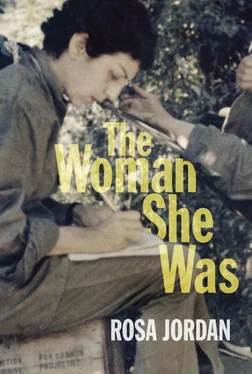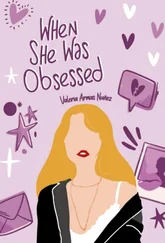As Celia turned into the parking lot her headlights picked out a small sign made of wooden arrows that pointed toward trails leading off in various directions. Pico Turquino she recognized; all Cubans knew it to be their island’s highest peak. La Placitas and Humanities she could imagine; tiny mountain hamlets of four or five families, accessed by trails rather than roads. The bottom arrow read La Comandancia .
She parked the car and from her bag took a pencil-sized flashlight she always carried because one could count on electricity going off just about anywhere in Cuba at any time. It was nearing sunrise and should have been light, but massive thunderclouds kept it, if not quite pitch-dark, then close enough.
The trail leading to La Comandancia was on the opposite side of the road from the parking lot. She followed it into a forest of ancient mahogany trees, each one bearded with long grey strands of Spanish moss. A wire gate barred the path. Swinging her light along the wire, she saw that there was a person-sized gap in the fence at the end of the gate. She squeezed through.
For a short distance the path was more or less level, smooth and easy to follow. Then it became less even. Where it pitched up or down, rain runoff had turned it into a trench just the width of the trail, sometimes ankle-deep, sometimes knee-deep. Rocks rolled treacherously underfoot.
It was not yet sunrise but getting light when she reached what appeared to be an uninhabited farmhouse. As she approached she saw a large thatched-roofed, open-sided room and guessed that it served as a visitor’s rest stop. The trail seemed to end there, but she was sure it did not. She switched off the flashlight to save batteries and instinctively turned right. Once around the old farmhouse she saw that the trail dipped into a small rivulet, then continued upward.
Occasionally the heavy forest of mahogany and strangler figs fell away, giving breathtaking views across a labyrinth of deep ravines that sliced between the most rugged mountains she had ever seen. Everything seemed familiar, and at the same time astonishing. Celia had not known that such wild areas still existed in Cuba.
Red light spilled across the landscape with startling brightness. Turning to look back, she saw that the sun was a red ball balanced in a narrow slot of clear sky between earth and leaden clouds. As it moved upward and behind the thunderheads, it became half a sun, then none. The landscape faded back into shades of grey, although lighter than before. Celia turned to continue uphill and gasped. While she was watching the sunrise, a man was watching her.
“Compañera,” he said sternly. “It is prohibited for visitors to walk this trail without a guide. Didn’t you see the sign at the park entrance?”
“I—it was dark. There was no one there.” Celia’s distress was not feigned. To have come so far, only to be stopped! Her knees, already shaky from the climb, seemed to give out entirely. She leaned against a boulder and finding it not adequate support simply sat down.
The man knelt beside her. Higher up the trail, looming above her, he had seemed tall. In reality he was a small man, scarcely as tall as herself.
His face registered concern at her sudden collapse. “Are you all right?”
“Yes. I—I just need to rest a bit.”
“No hurry,” he said. “I will wait with you. You were going to La Comandancia?”
As if the trail led anywhere else, she thought, but nodded politely. “I have never been there, and this morning—this is my only chance.”
“I see. Unfortunately the guides do not arrive until eight.”
It occurred to her that it would be better to go with him than not to get there at all. “But you are here.”
“Well, yes. But I am not a guide.”
“Are you from Santo Domingo?”
“I am. Did you visit the museum?”
“No, not yet.”
“It was my home. Before the war.”
“Really?” She gave him a second look. “You were here then?”
“I was born here. Already ten years old when the war reached this area. The soldiers forced us out of our home, that house where the museum is now.”
Celia was shocked. “The rebels did that?”
The man laughed at her confusion. “The rebels? No! Batista’s troops. Our house was a very nice one. Four rooms. The commander, he had his men cut a hole in the floor, right through the strong boards my grandfather had shaped by his own hand from trees such as these.” He flung out his arm to indicate the forested slope.
“More than two metres square this hole was, and two metres deep. He had them lower a bed into the hole, my parents’ bed it was, and he got in that bed and stayed there night and day. That’s what kind of coward he was. He said he had migraines and perhaps he did, but I think it was his cowardliness that made him sick. That and the terrible things he did. He had a terror of a mortar attack on the house so he hid in that hole while his troops perished and messengers brought him word of one defeat after another.”
“You were here!” Celia was so thrilled by this human connection to the past that her disappointment was momentarily forgotten.
“Yes. I was a guerrilla.”
“Surely you are not that old!”
“I told you. I was ten years old when the rebel army made their headquarters here.” He jutted his chin toward the Comandancia. “I was one of them.”
Perhaps taking Celia’s silence for skepticism, which in fact it was, he went on to give details that, Celia suspected, he had recounted many times. “All the men in the village were already with Fidel. Or dead,” he added gravely. “My papá, because he protested when Batista’s men put us out of our house, he was shot. And others.”
He paused for emotion or dramatic effect, then continued. “There were only a few old men, and they were closely watched. The women, too, for by that time it was known that there were women with the guerrillas. It often fell to children to be the rebels’ eyes and ears. It was easy for us. One minute we would be skipping stones in the stream or gathering firewood for our mother, and the next minute we would have slipped away to carry a message or food or whatever there was to be carried to La Comandancia.”
“My mother was one of them,” Celia said suddenly. In fact, her mother had spent most of the war in the Oriente, under Raúl’s command. But she had been recruited by Celia Sánchez and was brought here first for a month of training before being sent with others to the Second Front in the Sierra Cristal.
“She was a rebel soldier?”
“Yes. And a nurse.”
“Where is she now?”
“Dead, I’m afraid.”
“Killed in the war?”
“No. Cancer. She was a very heavy smoker.”
The man nodded, as if Celia had just provided a detail that authenticated her claim to having had a warrior mother. “One of the city girls.”
“From Pilón, yes. How did you know?”
“All of those women who came from the city to fight with Fidel were smokers. As a child, this was something I had not seen before, women smoking. But those women from the city, they all did.”
“Do they now? Your women, I mean. Do they smoke?”
He thought about it for what seemed like a long time, long enough for Celia to realize that he must be visualizing the faces of all the women in his community.
“Some,” he said finally. “Those who have gone to live in town, they come back smoking. Because they have money, you see.”
“And the men?” Celia asked, although she knew the answer. “Did they smoke then? And do they now?”
He looked at her with surprise. “Of course. Smoking is a man’s thing, no?”
As if to prove his point, and to acknowledge that she was an outsider, an urbanite, he took a packet of cigarettes from his shirt pocket, shook one out, and offered it to her.
Читать дальше












